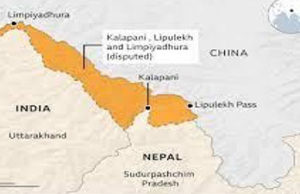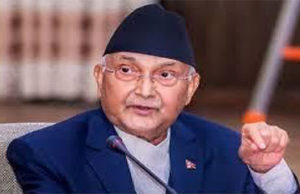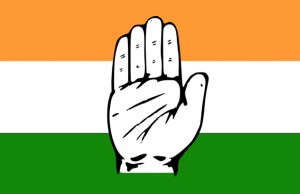Kalapani: Symbol of new Nepali Nationalism

By Sakshi Tiwari
Nepal under Prime Minister Oli is undergoing a major policy metamorphosis vis a vis India. The National Assembly or the upper house of the Nepalese parliament passed the constitutional amendment bill today that provides for the inclusion of newly revised map in the National emblem. This development came few days after the Lower house unanimously passed the bill that gives official authentication to the map that includes territories of Kalapani, Lipulekh and Limpiyadhura.
The move has been touted as cartographic aggression by the Indian government and even though there have been some comments from the External Affairs Ministry and the Defence Minister of India, there has been no urgency in the tone given that the Indian government has a bigger front open at the Chinese border. In fact, some analysts have said that China is most likely to, or has already exploited the sour relations between Nepal and India.
The Kalapani dispute is not new and the bugle for it was sounded post abrogation of Article 370 in India that led to India publishing new set of maps. Nepal had objected to the maps then in November, 2019 claiming that the Kalapani region belongs to it, however nothing substantial followed the shrill opposition. The new thaw in relations and subsequent amendment is a result of India inaugurating a new road in the contested region connecting Dharchula road to Lipulekh pass in order to cut short the time taken by pilgrims to reach Kailash Mansarowar. Even though India has manned the entire region contested by Nepal for decades, it is only now that Nepal has expressed serious reservations based on Treaty of Sugauli signed in 1816. In fact, the Lipulekh pass has been the major point of trade between China and India for years. At the time when the treaty was signed, the river Kali was taken as the defining border. However, over time the origin of Kali has become a bone of contention giving rise to a border dispute.
The fact that Oli has pushed the amendments almost immediately after conveying his opposition to the neighbor could be due to his waning popularity as the Prime Minister. Now that he has completed two years at the helm, there have been murmurs from some quarters that a no- confidence motion could be passed against him. The domestic politics of Nepal hasn’t been as stable as he had promised before taking over as the Prime Minister. Oli is riding on the wave of Ultra nationalism that has rallied the entire country behind him, thus pushing the entire domestic dissatisfaction under the rug.
The national sentiments in Nepal have been based on the premise of Anti-India politics and Oli has used this as an opportunity, thus taking the Opposition Nepali Congress led by Deuba on board. He has successfully changed the face of Nepalese pride by making it about territorial sovereignty. This is a masterstroke given that any virulent opposition to this national policy will only strengthen his hold over domestic politics.
Nepal has been inimical to India ever since it accused India of interfering in drafting of its constitution by sowing discontent within the Madhesi community and the subsequent economic blockade imposed by it that brought Nepal, a country that was recovering from a massive earthquake, on its knees. This was the tipping point that led to Anti Indian sentiment. To this day, the concocted exploitation of the Nepalese people is fresh in the minds of the general populace and Oli is now using it to his advantage, with an aim of establishing himself as the strongest leader of democratic Nepal- this at a time when there has been visible resentment related to his style of governance and his failure to handle the corona outbreak more diligently. Another issue making Oli particularly uncomfortable was the National Communist Party’s push to a reform that would leave no choice in front of Oli but to choose between the seat of Prime Minister or the President of his beloved party. He threw his weight behind the best bet of Nepali Nationalism and is now meticulously holding on to it. With India embroiled with China and the proximity of Nepal with the latter, Oli does not stand to lose much in the near future.
The next step forward, however, should be to engage in a dialogue with India because of how closely our civilizations and economy are tied together. The two Ts- Territory i.e the Kalapani issue and Treaty i.e the archaic agreement of friendship must be upgraded and signed afresh to reflect the current realities of the relationship and there should be push for clear and consistent communication in order to resolve any future conflicts that arise between the two countries.
Author is a journalist with expertise in Defence, International and Geo-strategic affairs.






You must be logged in to post a comment Login